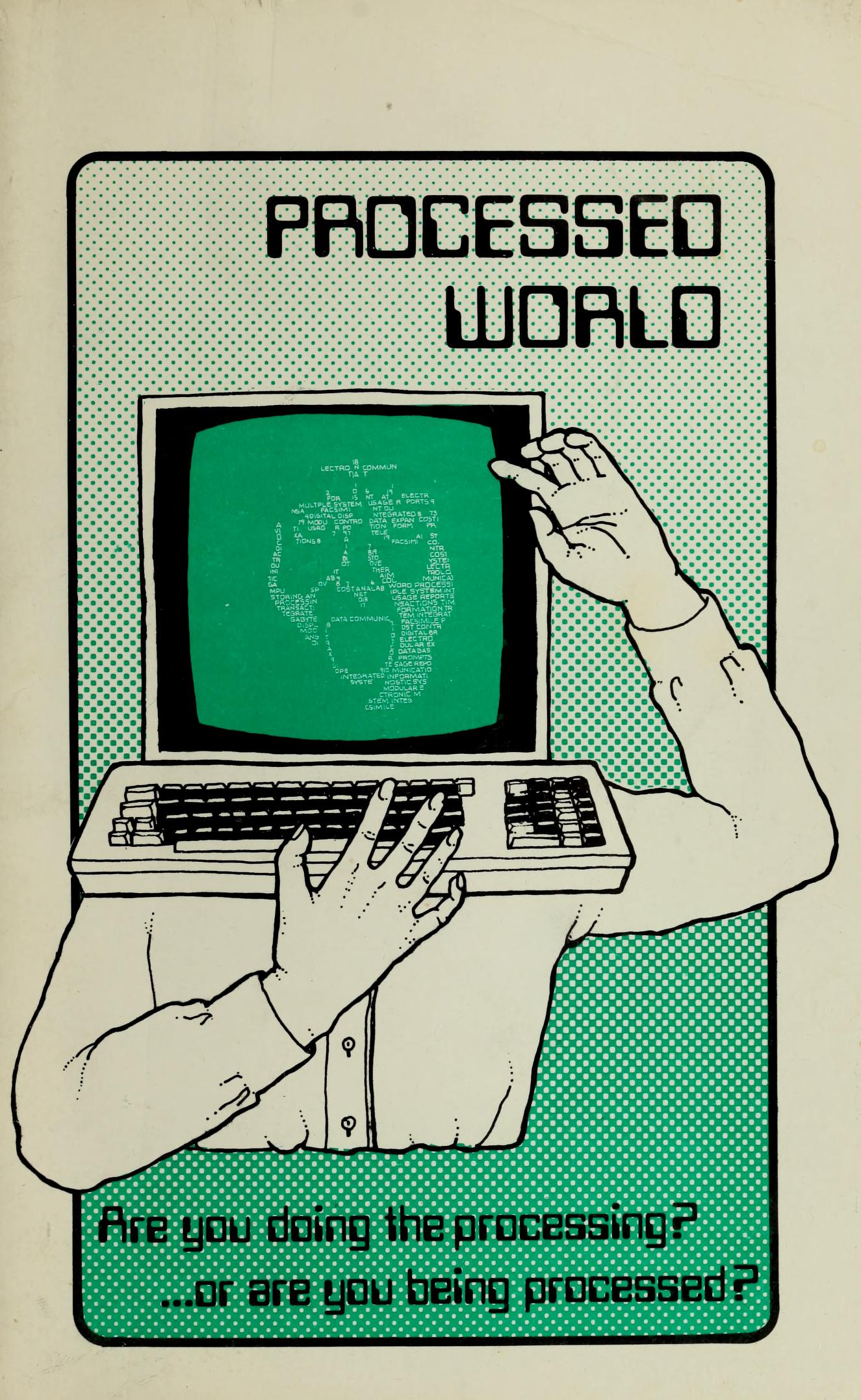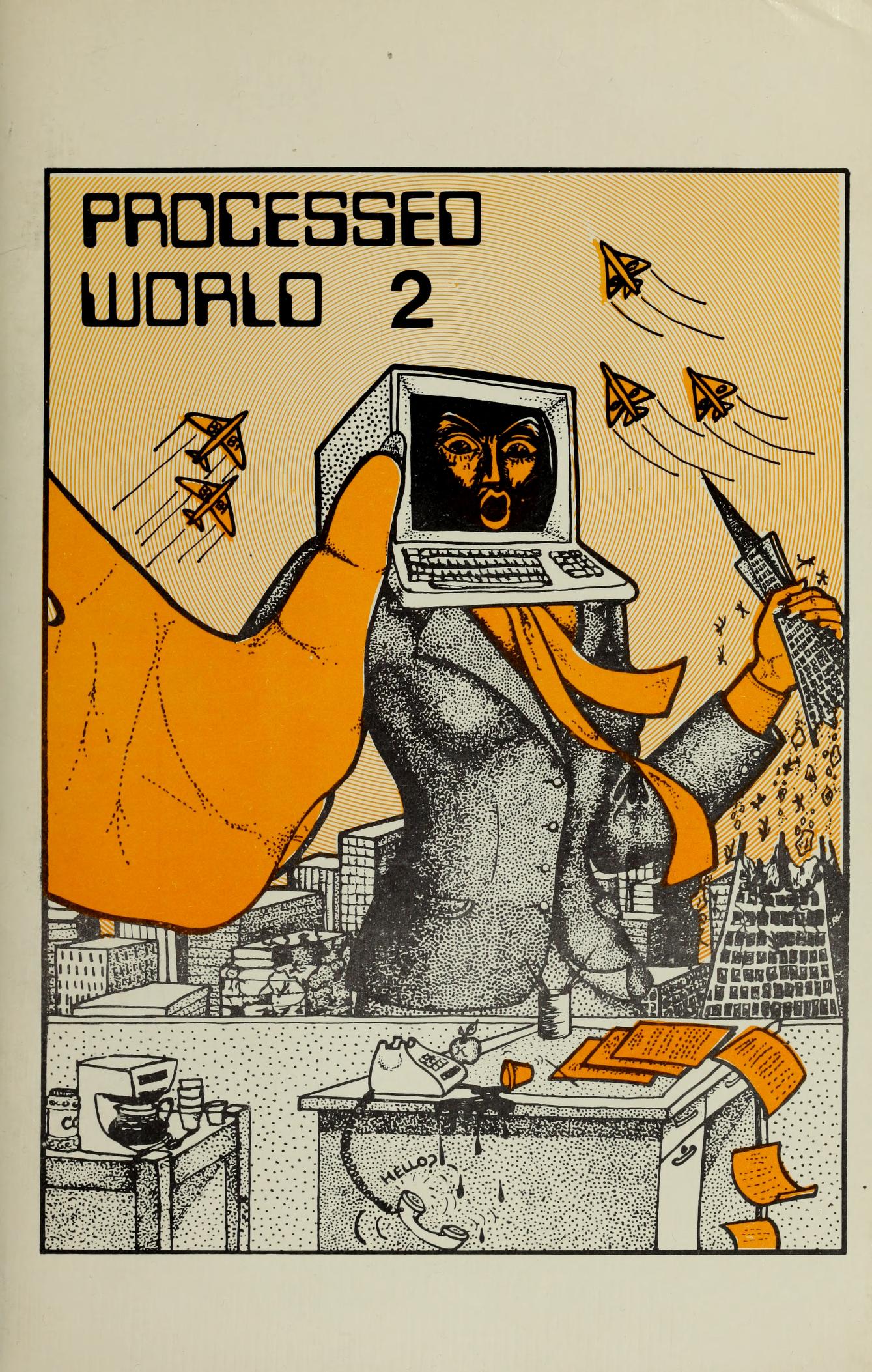Processed World, 1-33 + 2.001 + 2.005 (1981-2005)
Filed under magazine | Tags: · activism, anarchism, employment, information economy, labour, subversion, work


Processed World is an anarchist magazine about the absurdity of modern office work. The magazine was founded in 1981. No new issues have been produced since 2005.
The magazine is about the absurdity and futility of modern employment practices in which a large number of college-educated people are often forced to seek temporary work with no worker benefits. The magazine details the subversive attitudes and sense of humor required for workers to be able to get through the day when forced to perform dull, degrading and boring work as wage slaves doing modern office work such as working as a computer programmer, word processor, call center operator, data entry operator, telemarketer or file clerk.
The print magazine was widely distributed to and read by office workers in Downtown San Francisco during the years the print magazine was published from 1981 to 1992.
Writers that have had work published by the magazine include Chris Carlsson, Fred Rinne, Adam Cornford, John Norton, Jesse Drew, and Donna Kossy. The magazine featured cartoons by artists such as Tom Tomorrow, Jay Kinney, and Paul Mavrides. (Wikipedia)
Publisher Processed World, San Francisco, 35 numbers, 1981-2005
via fcr
Commentary: Jacob Silverman (Baffler, 2014)
HTML
PDF and other formats (Internet Archive)
Virginia Eubanks: Digital Dead End: Fighting for Social Justice in the Information Age (2011)
Filed under book | Tags: · critique of technology, digital divide, information economy, neoliberalism, participation, technology

The idea that technology will pave the road to prosperity has been promoted through both boom and bust. Today we are told that universal broadband access, high-tech jobs, and cutting-edge science will pull us out of our current economic downturn and move us toward social and economic equality. In Digital Dead End, Virginia Eubanks argues that to believe this is to engage in a kind of magical thinking: a technological utopia will come about simply because we want it to. This vision of the miraculous power of high-tech development is driven by flawed assumptions about race, class, and gender. The realities of the information age are more complicated, particularly for poor and working-class women and families.
Describing her attempts to create technology training programs with a community of resourceful women living at her local YWCA, Eubanks shows that information technology can be both a tool of liberation and a means of oppression. High-tech jobs for women in the YWCA community are data entry positions that pay $7 an hour. At work, their supervisors monitor every keystroke. The state offers limited social service benefits in exchange for high-tech monitoring and surveillance of their lives, families, and communities.
Despite the inequities of the high-tech global economy, optimism and innovation flourished when Eubanks and the women in the YWCA community collaborated to make technology serve social justice. Eubanks describes a new approach to creating a broadly inclusive and empowering “technology for people,” popular technology, which entails shifting the focus from teaching technical skill to nurturing critical technological citizenship, building resources for learning, and fostering social movement.
Publisher MIT Press, 2011
ISBN 026201498X, 9780262014984
266 pages
a lecture by the author (video)
PDF (updated on 2012-9-23)
Comments (2)Kazys Varnelis (ed.): Networked Publics (2008)
Filed under book | Tags: · blogging, capitalism, filesharing, information economy, internet, internet of things, locative media, mass media, media ecology, network culture, network society, networks, p2p, rfid, viral marketing, web 2.0, youtube

Digital media and network technologies are now part of everyday life. The Internet has become the backbone of communication, commerce, and media; the ubiquitous mobile phone connects us with others as it removes us from any stable sense of location. Networked Publics examines the ways that the social and cultural shifts created by these technologies have transformed our relationships to (and definitions of) place, culture, politics, and infrastructure.
Four chapters—each by an interdisciplinary team of scholars using collaborative software—provide a synoptic overview along with illustrative case studies. The chapter on place describes how digital networks enable us to be present in physical and networked places simultaneously (on the phone while on the road; on the Web while at a café)—often at the expense of non-digital commitments. The chapter on culture explores the growth of amateur-produced and -remixed content online and the impact of these practices on the music, anime, advertising, and news industries. The chapter on politics examines the new networked modes of bottom-up political expression and mobilization, and the difficulty in channeling online political discourse into productive political deliberation. And finally, the chapter on infrastructure notes the tension between openness and control in the flow of information, as seen in the current controversy over net neutrality. An introduction by anthropologist Mizuko Ito and a conclusion by architecture theorist Kazys Varnelis frame the chapters, giving overviews of the radical nature of these transformations.
Contributors: Walter Baer, François Bar, Anne Friedberg, Shahram Ghandeharizadeh, Mizuko Ito, Mark E. Kann, Merlyna Lim, Fernando Ordonez, Todd Richmond, Adrienne Russell, Marc Tuters, Kazys Varnelis.
Publisher MIT Press, 2008
ISBN 0262220857, 9780262220859
176 pages
author (includes a research blog and lecture videos)
publisher
google books
PDF (updated on 2012-8-7)
Comment (0)
